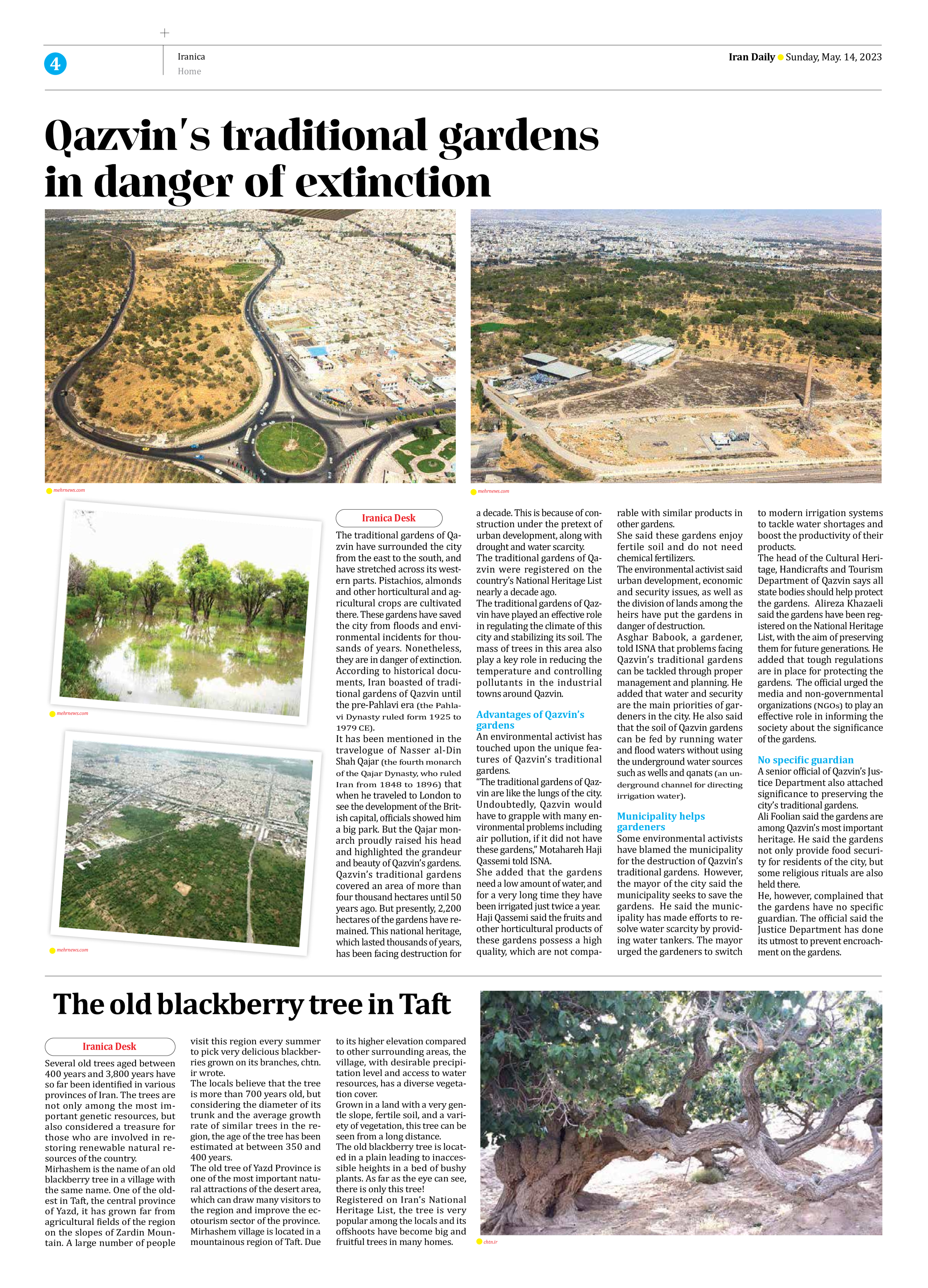
Qazvin’s traditional gardens in danger of extinction
The traditional gardens of Qazvin have surrounded the city from the east to the south, and have stretched across its western parts. Pistachios, almonds and other horticultural and agricultural crops are cultivated there. These gardens have saved the city from floods and environmental incidents for thousands of years. Nonetheless, they are in danger of extinction.
According to historical documents, Iran boasted of traditional gardens of Qazvin until the pre-Pahlavi era (the Pahlavi Dynasty ruled form 1925 to 1979 CE).
It has been mentioned in the travelogue of Nasser al-Din Shah Qajar (the fourth monarch of the Qajar Dynasty, who ruled Iran from 1848 to 1896) that when he traveled to London to see the development of the British capital, officials showed him a big park. But the Qajar monarch proudly raised his head and highlighted the grandeur and beauty of Qazvin’s gardens.
Qazvin’s traditional gardens covered an area of more than four thousand hectares until 50 years ago. But presently, 2,200 hectares of the gardens have remained. This national heritage, which lasted thousands of years, has been facing destruction for a decade. This is because of construction under the pretext of urban development, along with drought and water scarcity.
The traditional gardens of Qazvin were registered on the country’s National Heritage List nearly a decade ago.
The traditional gardens of Qazvin have played an effective role in regulating the climate of this city and stabilizing its soil. The mass of trees in this area also play a key role in reducing the temperature and controlling pollutants in the industrial towns around Qazvin.
Advantages of Qazvin’s gardens
An environmental activist has touched upon the unique features of Qazvin’s traditional gardens.
“The traditional gardens of Qazvin are like the lungs of the city. Undoubtedly, Qazvin would have to grapple with many environmental problems including air pollution, if it did not have these gardens,” Motahareh Haji Qassemi told ISNA.
She added that the gardens need a low amount of water, and for a very long time they have been irrigated just twice a year.
Haji Qassemi said the fruits and other horticultural products of these gardens possess a high quality, which are not comparable with similar products in other gardens.
She said these gardens enjoy fertile soil and do not need chemical fertilizers.
The environmental activist said urban development, economic and security issues, as well as the division of lands among the heirs have put the gardens in danger of destruction.
Asghar Babook, a gardener, told ISNA that problems facing Qazvin’s traditional gardens can be tackled through proper management and planning. He added that water and security are the main priorities of gardeners in the city. He also said that the soil of Qazvin gardens can be fed by running water and flood waters without using the underground water sources such as wells and qanats (an underground channel for directing irrigation water).
Municipality helps gardeners
Some environmental activists have blamed the municipality for the destruction of Qazvin’s traditional gardens. However, the mayor of the city said the municipality seeks to save the gardens. He said the municipality has made efforts to resolve water scarcity by providing water tankers. The mayor urged the gardeners to switch to modern irrigation systems to tackle water shortages and boost the productivity of their products.
The head of the Cultural Heritage, Handicrafts and Tourism Department of Qazvin says all state bodies should help protect the gardens. Alireza Khazaeli said the gardens have been registered on the National Heritage List, with the aim of preserving them for future generations. He added that tough regulations are in place for protecting the gardens. The official urged the media and non-governmental organizations (NGOs) to play an effective role in informing the society about the significance of the gardens.
No specific guardian
A senior official of Qazvin’s Justice Department also attached significance to preserving the city’s traditional gardens.
Ali Foolian said the gardens are among Qazvin’s most important heritage. He said the gardens not only provide food security for residents of the city, but some religious rituals are also held there.
He, however, complained that the gardens have no specific guardian. The official said the Justice Department has done its utmost to prevent encroachment on the gardens.







